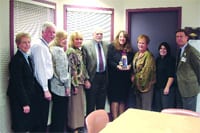Running for Their Lives Go FIT Marks Two Years of Promoting Physical Fitness
In the brochure Susan Jaye-Kaplan hands out to promote Go FIT, the logo features three words below the title: walking, running, mentoring.
The first two, she says, would hardly matter without the third.
“Of all those components, mentoring is the most integral part of the program,” said Jaye-Kaplan, who founded the Springfield-based non-profit two years ago to promote physical fitness in women and young people. “We don’t use volunteers who might come one day when it’s convenient. A mentor invests in our programs, and when people are invested, it’s more than just showing up; it’s making a conscious effort to be a part of someone’s life.”
It’s a critical distinction considering the central emphasis of Go FIT: the benefits of walking and running, and on a larger scale, the need to make exercise and good nutrition a conscious lifestyle decision. That means making good health choices a habit, and habits are born over time, not from a one-time speech, Jaye-Kaplan said.
That’s the idea behind the Go FIT clinics, six- to eight-week programs that are conducted at area schools, child care centers, YMCAs, and other locations — events at which the volunteer mentors help the participants, all of them economically needy, learn how to exercise and eat properly.
This month, The Healthcare News examines the Go FIT model, and where Jaye-Kaplan and her staff plan to take it from here.
Heart for Health
Jaye-Kaplan doesn’t need her running shoes to get her heart racing; her enthusiasm for the organization’s mission is palpable.
In a nutshell, Go FIT offers physical fitness programs for children ages 3 through 19, as well as adult women. “All are from economically underprivileged and underserved populations,” she said. “The children are those on free or reduced lunch, or from shelters and community centers. They’re not children of means. And being an orphan, I was one of them myself, so I know how important it is that the community gives something back.”
Each Go FIT clinic date includes several components, Jaye-Kaplan said. First is the “friendship circle,” in which mentors and participants get to know each other.
Everyone wears a lanyard with their name, and we try to call the children by their name at least five times,” she said. “It lets them know that someone cares about them.”
After that comes a guest speaker; Go FIT has 12 of them available, including nutritionists, dental hygienists, psychologists, and specialists in substance abuse, violence prevention, bike safety, CPR, even yoga. Participants may receive handouts at this session; Go FIT produces literature in six different languages.
“We talk about character education, stress management, wearing ‘positive glasses’ versus ‘negative glasses’ — how we see ourselves during the day,” Jaye-Kaplan said.
That leads into the meat of the event: physical exercise. After a warmup exercise, every session features a 30-minute session of walking and running, followed by another activity, such as circuit training, jump rope, dance, or hula hoops.
“We end with a sharing circle, where we come back in and talk about goals and expectations, and make journals about those things,” she said. “Those journals are private; they don’t have to share them with us. Then we dismiss them with a healthy snack of fruit and provide transportation if needed.”
Throughout, the mentors offer a face-to-face element that makes each participant feel like a valued part of the event — and, just as important, provides encouragement to turn the day’s lessons into long-term habits.
“It’s not enough to tell kids to be physically active. They need to understand the reasons behind it, so we stress that exercise keeps the heart healthy,” Jaye-Kaplan said. “We want to change their whole perspective, and if they start young, hopefully they’ll do it for the rest of their lives.”
Walk of Life
The children, teenagers, and women who take part in the clinics receive plenty of freebies, including T-shirts, water bottles, pedometers, hats, gym bags, and running shoes, the latter donated by Reebok, which came on board after Jaye-Kaplan and her husband spent $8,000 on running shoes during the first year of Go FIT. But most importantly, she said, the participants receive a dose of reality.
“We find that 85{06cf2b9696b159f874511d23dbc893eb1ac83014175ed30550cfff22781411e5} of those starting the clinic cannot sustain a 30-minute walk-run,” which consists of four minutes walking and one minute running, repeated six times, she said. It’s not shocking, she said, considering that one in three Americans lives what could be called a sedentary lifestyle, and an estimated 15{06cf2b9696b159f874511d23dbc893eb1ac83014175ed30550cfff22781411e5} of U.S. children and teenagers are obese. That sort of conditioning can’t be turned around in one event, which is why the mentors are so important, providing the one-on-one encouragement participants need to do their homework and gradually develop good, lasting habits.
“When you attend a clinic, you can see first-hand the interaction between a mentor and a child, and how important that mentor becomes in that child’s life,” said Karen Woltjen Hines, a veteran of marketing both for-profit and non-profit organizations, who was recently brought on board as executive director.
“The director running the program might talk to 20 or 30 people at a time, but the mentor has one-on-one conversations about the importance of eating right and exercising. You can sense the reward you get as a mentor to have that kind of impact on a child’s life.”
The new position of executive director reflects the growth of Go FIT — and how difficult it has been for Jaye-Kaplan to handle both the day-to-day operations and needs like marketing and fundraising, not to mention cultivating relationships with organizations throughout Greater Springfield.
One of those, Springfield Day Nursery, which cares for some 900 children at a time, has benefited from Go FIT programs at its many sites. Director Joan Kagan said the offerings mesh well with the sorts of health-related messages SDN seeks to instill in its young charges.
“When we talk about health, we talk about it in a most expansive way — oral health, medical health, emotional health, social health, and physical health,” Kagan said. “So we look for resources in the community to bring to children that address all those needs.
“The Go FIT program provides our children with wonderful information and education around the importance of taking care of their bodies, around nutrition, the importance of eating the right foods and how to choose the right foods that can make your body healthy and make you feel good, but that taste good too,” she added.
The lessons can be expansive, Kagan said; for instance, a program on exercising safely went beyond health matters and encompassed common-sense advice such as not wearing a ponytail when jogging, because it can be easily grabbed by an attacker. “All of this — nutrition, exercise, and personal safety — is very, very important to children’s growth and development,” she said, “and it impacts their ability to learn in school.”
Steady On
Woltjen Hines knows Go FIT has a good thing going, evidenced by the variety of local companies that support it, including Bay Path College, Lenox American Saw, Big Y, Yankee Candle, Baystate Health, the Community Foundation of Western Mass., Hasbro, Health New England, Spalding, Staples, Wal-Mart, Western New England College, and a number of banks.
“Go FIT has held 23 clinics and impacted 650 kids in its first two years,” Woltjen Hines said, adding that a United Way official told her that the organization’s growth has been substantially faster than other regional non-profits. “The future lies in whatever direction the board decides to go, whether that’s local, regional, or even national. It’s tremendous to see the value of Go FIT, and I feel like I can make an impact in that process.”
Jaye-Kaplan said Go FIT has 117 organizations on its waiting list — waiting, because they’re not based in Massachusetts, and Go FIT has yet to expand its offerings beyond this region. “We have the potential to be national,” she asserted. “But right now, we want to be the best we can in Western Mass.
“Whatever happens, we’ll always have grass roots in Springfield,” she added. “We’re well-supported by this community, and frankly, we think we’ll be here for a long time, whether or not we go national.”
No, Go FIT isn’t sprinting toward its next goal. As its founder well knows, a steady walk can reap just as many rewards.


